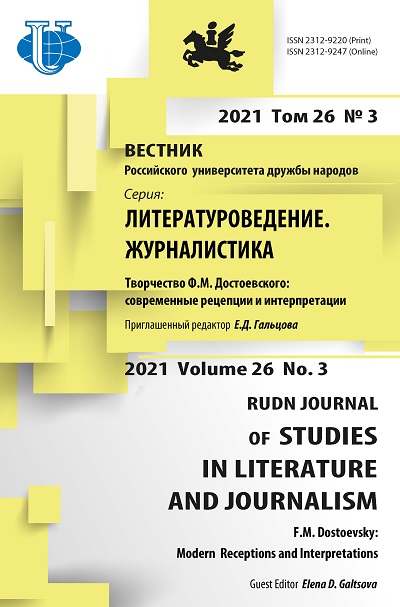A.N. Veselovsky’s Theory of Motive and Plot in the Reflection of a Folk Tale
- Authors: Govenko T.V.1
-
Affiliations:
- A.M. Gorky Institute of World Literature of the Russian Academy of Sciences
- Issue: Vol 26, No 3 (2021): F.M. DOSTOEVSKY: MODERN RECEPTIONS AND INTERPRETATIONS
- Pages: 511-518
- Section: LITERARY CRITICISM
- URL: https://journals.rudn.ru/literary-criticism/article/view/27652
- DOI: https://doi.org/10.22363/2312-9220-2021-26-3-511-518
- ID: 27652
Cite item
Full Text
Abstract
The article deals with the main provisions of the theory of motive and plot of the outstanding Russian philologist A.N. Veselovsky (1838-1906) in the light of a folk tale. At the archaic stage, as the scientist believed, the composition of the fairy tale obeyed the laws of syncretic consciousness and dualistic worldview, which determined the specifics of not only its existence, but also the logical and semantic basis of the fairy-tale model. With the transition to the religious-historical paradigm of public consciousness, there is a semiotic and morphological reorganization of the plot of the fairy tale. The task is to find out how the scientific method of differentiated study of motive and plot allowed Veselovsky to prove that the operating system of the motive is strongly connected with apperception and suggestion, and the plot - with combination and discourse, that the motive is directly related to fiction, and the plot - to the idea, but at the same time their commonality is expressed by the ideological and artistic concept.
About the authors
Tatiana V. Govenko
A.M. Gorky Institute of World Literature of the Russian Academy of Sciences
Author for correspondence.
Email: govenko@mail.ru
ORCID iD: 0000-0002-1296-8399
PhD in Philology, Senior Researcher, A.M. Gorky Institute of World Literature of the Russian Academy of Sciences, Associate Professor of the Department of Russian Classical Literature, Deputy Head of the Center of the Russian Language and Culture. A.F. Losev Institute of Philology of the Moscow Pedagogical State University
25a Povarskaya St, Moscow, 121069, Russian FederationReferences
- Veselovskij, A.N. (2006). From an Introduction to Historical Poetics. Questions and answers. In A.N. Veselovskij. Selected works: Historical poetics (pp. 55–74). Moscow: ROSSPEN Publ. (In Russ.)
- Veselovskij, A.N. (2010). On the method and tasks of the history of literature as a science. In: A.N. Veselovskij. Selected works: On the way to historical poetics (pp. 9–21). Moscow: Avtokniga Publ. (In Russ.)
- Veselovskij, A.N. (2006). Definition of poetry. In A.N. Veselovskij, Selected works: Historical poetics (pp. 81–170). Moscow: ROSSPEN Publ. (In Russ.)
- Veselovskij, A.N. (2006). Poetics of plots. In A.N. Veselovskij. Selected works: Historical poetics (pp. 535–670). Moscow: ROSSPEN Publ. (In Russ.)
- Veselovskij, A.N. (1938). Notes and doubts about the comparative study of the medieval epic (1868). In Collected Works of A.N. Veselovsky (Vol. 16, pp. 1–82). Moscow; Leningrad: Academy of Sciences of the USSR Publ. (In Russ.)
- Veselovskij, A.N. (1938). Lorren fairy tales (1887). In Collected Works of A.N. Veselovsky (Vol. 16, pp. 212–230). Moscow; Leningrad: Academy of Sciences of the USSR Publ. (In Russ.)
- Yakobson, R.O. (2011). Formal School and modern Russian literary studies. Moscow: Languages of Modern Cultures. (In Russ.)
- Maslov, B.P. (2016). Automation of the poetic language: about the conceptual prerequisites of the Russian morphological method. In Questions of philosophy, (10), 121–131. (In Russ.)
- Silantyev, I.V. (2004). The poetics of the motif. Moscow, Languages of Slavic culture Publ. (In Russ.)
- Makhov, A.E. (2016). From the history of the concept of «motif»: Veselovsky versus Sherler. In Legacy of Alexander Veselovsky in the world context. Research and materials (pp. 83–99). Moscow; Saint-Petersburg: Center for Humanitarian Initiatives Publ. (In Russ.)
Supplementary files















